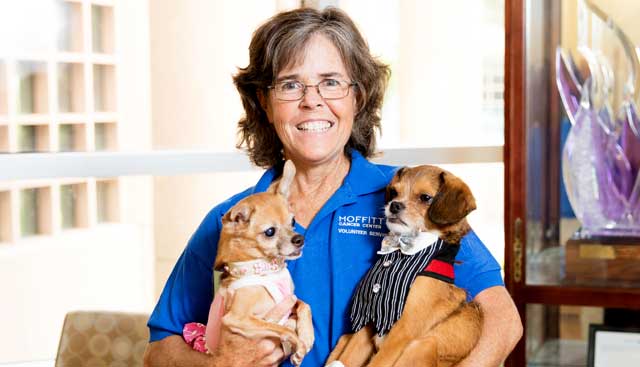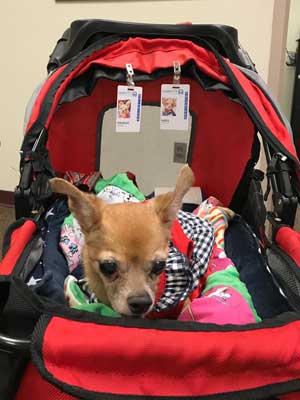
Five Questions With: Pam Dickens, Pet Therapy Program Volunteer
Furry hugs, wagging tails, gentle licks and countless smiles. If a cancer patient wants a dog to play with or just connect with during their stay at Moffitt, the Pet Therapy program provides just that. The Pet Therapy program at Moffitt Cancer Center utilizes trained animals and handlers through Animal Assisted Therapy to achieve physical, social, cognitive and emotional goals with patients. These therapy dogs provide the ultimate distraction from hospital life. Studies show animal-assisted therapy can decrease anxiety and pain, lower blood pressure and increase a patients’ emotional well-being.
The Pet Therapy program volunteers visit the outpatient area of Moffitt’s Magnolia campus every Tuesday, Wednesday and Thursday and makes floor visits every Thursday. Pet Therapy is also available at Moffitt at International Plaza from 1 to 3 p.m. Wednesdays. The program is exploring the possibility of expanding to include Moffitt McKinley Outpatient Center.
We sat down with volunteer Pam Dickens to talk about her involvement with the program.
1. Why did you get involved with the Pet Therapy program at Moffitt Cancer Center? How long have you been volunteering?
I’ve been volunteering at Moffitt since 1989. I’m a veterinary technician and the clinic where I worked is where one of Moffitt’s neurologists took her two dogs. She kept asking when a Pet Therapy program would be started [at Moffitt]. In 1988 I already had two dogs, I was doing therapy work at nursing homes and decided to begin working with Moffitt to get a program started the following year.
2. What is the process of getting the dogs certified to be therapy dogs?
There are different programs that will certify your dog for therapy. Canine Good Citizens (CGC) is a behavioral program where you can take your dog to classes and at the end they test the dogs making sure they can be left on the leash and can sit and stay when the handler is out of sight.

There are also other programs like Pet Partners, Intermountain Therapy Animals and Project Pup. Project Pup is the local program where my two dogs, Huey and Chicklet, were certified. It is a one-time test where the dog and handlers go to a nursing home and rehab center to test the dog, looking at the dog’s temperament and behavior on leash as well as monitoring the dog and handler relationship. There is an actual visitation with the patient where they monitor how the dogs interact with the patient. The patients will pass by with
a wheelchair, cane or walker creating a fairly noisy environment and the dogs’ response is observed.
3. What effects have you seen the dogs have on the patients?
Generally, the patients are able to relax and enjoy the dogs and talk about their own pets. Talking about their own pets can bring them a lot of joy, it creates a safe environment. The patients can just talk about the dogs if they want, talk about their own diagnosis, or pet the dogs and not talk; it’s up to the patient.
4. What interactions do the dogs have with the patients? What does typical visit look like?
It can vary. Sometimes we are in the room for three to five minutes, other times we are in the room for 30 minutes. The unpredictability is nice. You don’t always know how the patient is feeling. Sometimes they don’t want to see the dog and then they’ll see the dog out in the hallway and change their mind and have the dog come back to their room. Sometimes we have patients walk the dog in the hallway which is a great way to get the patient up and walking. Other times the dog will climb in bed with the patients or get in their laps if they’re sitting in chairs.
5. Do your dogs enjoy coming to Moffitt? Are they always tired when they come home?
They love coming to Moffitt. They’re exhausted and it’s a quiet ride home. They get excited to come to Moffitt because that means they get a bath, get dressed and go to work. An important part of pet therapy is keeping your dogs groomed before each visit and making sure they want to visit. They have to like people; a lot of dogs can do all kinds of tricks but the personality of the dog has to be tolerant of a lot of human interaction in one day. We are not here to show what types of tricks the dog can do; we are here to provide a distraction, and give the patients a break in their day.
Five Questions With is an occasional series featuring Moffitt team members, patients and volunteers.
Interested in volunteering? Apply online or call Volunteer Services at 813-745-2254 to request an application by mail.
